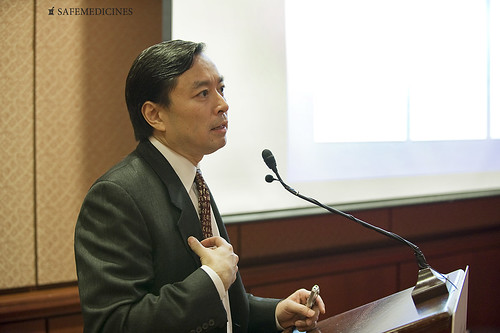Overseas Fake Pharmacies Prey on American Patients; Aided by U.S. Internet Companies
A rise in prescription drug addiction fuels the internet medicine selling business, with overseas operations luring U.S. addicts to websites where medication is unregulated, and dangerous.

“Crack down on pill mills, and people will go to the ‘Net because it’s an
easy source – and they deliver to your front door,” says Dr. Liang.
A rise in prescription drug addiction fuels the internet medicine selling business, with overseas operations luring U.S. addicts to websites where medication is unregulated, and dangerous.
The Palm Beach Post reviewed a number of online medicine hawkers, and found they are aided by major companies, though the sites themselves are often offshore.
Said The Post, the sites “typically relied on a U.S. Web support operation. In addition, social media is used to hawk drugs, and rogue pharmacies are as close as a search engine result.”
“Currently, the problem is the social media, Twitter and Facebook,” said Dr. Bryan Liang, vice-president of the Partnership for Safe Medicines. “Months ago, we did a search on Facebook and Twitter looking for online drugs. We found them,” he said, but not in great numbers. “Well, six to eight months later we checked again and they had infiltrated everywhere.”
A spokeswoman for Facebook said that they remove online drug sellers when they learn of them, depending upon Facebook’s users to alert the company of their existence. Google’s spokeswoman said “Search results are a reflection of the content of the web,” and that they only remove content from search results in very narrow cases, reported The Post.
But that is not where the U.S. company involvement ends. While the large social media sites may end up with users abusing their systems to advertise counterfeit and controlled medications, web link and support services are often provided by U.S. companies, found The Post. For example, U.S. companies will handle web operations, such as domain name service.
Florida investigators are concerned that as regional pill mills are closed, addicts will seek out medications from these sites online given that Florida had more drug overdose deaths in 2010 than car accident deaths.
“Crack down on pill mills, and people will go to the ‘Net because it’s an easy source – and they deliver to your front door,” said Dr. Liang.
Purchasing and selling narcotics without a valid prescription is a violation of federal law, and many sites examined by The Post offered medication without prescription.
Said Sean Ryan, an addiction specialist at the Hanley Center, “I found ten sites in ten minutes.”
But even more disturbing to these international violators of federal law are the claims of U.S. affiliations of these companies. On top of the access to these vendors provided by search engines and social media sites, many sites purport to have U.S. bases. But attempts to contact these U.S. bases were fruitless by The Post, suggesting that the addresses may be there just to fool consumers into believing they’re doing business with companies regulated by U.S. laws.
Investigators say that normally those websites are part of international operations that can stretch from an individual with a website registration in the Caribbean, to a different contact person in the South Pacific, a counterfeiter in Asia, and a return-to address that is completely invalid from North America.
Dr. Liang said that it is even common for pharmacies to ship drugs to one customer using another customer’s return address.
John Horton, founder of LegitScript, believes that for now “there’s incentive for bad actors to continue to set up as many of these sites as often as they can.”
Consumers can protect themselves and their loved ones by only purchasing medications online from VIPPS certified pharmacies that require prescriptions.